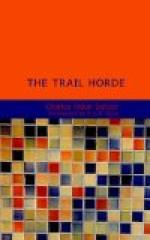Lawler said nothing in reply to Blackburn’s vitriolic speech. So unperturbed did he seem that Blackburn remarked to one of the men—after Lawler wrapped himself in a blanket and stretched out near the fire—that, “the more Lawler’s got on his mind the less he talks.”
Long before dawn Lawler saddled up and departed. When Blackburn awoke and rubbed his eyes, he cast an eloquent glance at the spot where Lawler had lain, grinned crookedly and remarked to the world at large: “Anyway, we’re backin’ his play to the limit—an’ don’t you forget it!”
Lawler left Red King at the stable from which, the day before, Gary Warden had ridden on his way to the Hamlin cabin; and when the west-bound train steamed in he got aboard, waving a hand to the friends who, the day before in the Willets Hotel had selected him as their spokesman.
It was afternoon when Lawler stepped from the train in the capital. He strode across the paved floor of the train shed, through a wide iron gate and into a barber-shop that adjoined the waiting-room.
There he gave himself to the care of a barber who addressed him as Mr. Lawler in a voice of respect.
“I’ve shaved you before, Mr. Lawler,” said the man. “I think it was when you was down here last year, to the convention. I heard the speech you made that time, nominating York Falkner for governor. Too bad you didn’t run yourself. You’d have made it, saving the state from the tree-toad which is hanging to it now.”
During his short stay at the Circle L the night before, Lawler had changed from his cowboy rigging to a black suit of civilian cut, with tight trousers that were stuffed into the tops of soft boots of dull leather. The coat was long, after the fashion of the period, cut square at the bottom, and the silk lapels matched the flowing tie that was carelessly bowed at the collar of a shirt of some soft, white material. He wore a black, felt hat; and out of consideration for the custom and laws of the capital, he had shoved his six-shooter around so that it was out of sight on his right hip. However, the cartridge-studded belt was around his waist; he kept the black coat buttoned over it, hiding it.
He had been in the capital often, and had no difficulty in finding his way to the capitol building. It was at the intersection of two wide streets—a broad, spacious structure of white stone, standing in the center of a well-kept grass plot. It was imposing, hinting of the greatness of the state that had erected it, suggesting broadness of vision and simple majesty.
The state was not at fault, Lawler reflected as he mounted the broad stone stairs that led upward to the interior of the building; the state was founded upon principles that were fundamentally just; and the wisdom of the people, their resources, their lives, were back of it all. This building was an expression of the desire of the people; it represented them; it was the citadel of government from which came the laws to which they bowed; it was the visible arm of power.




